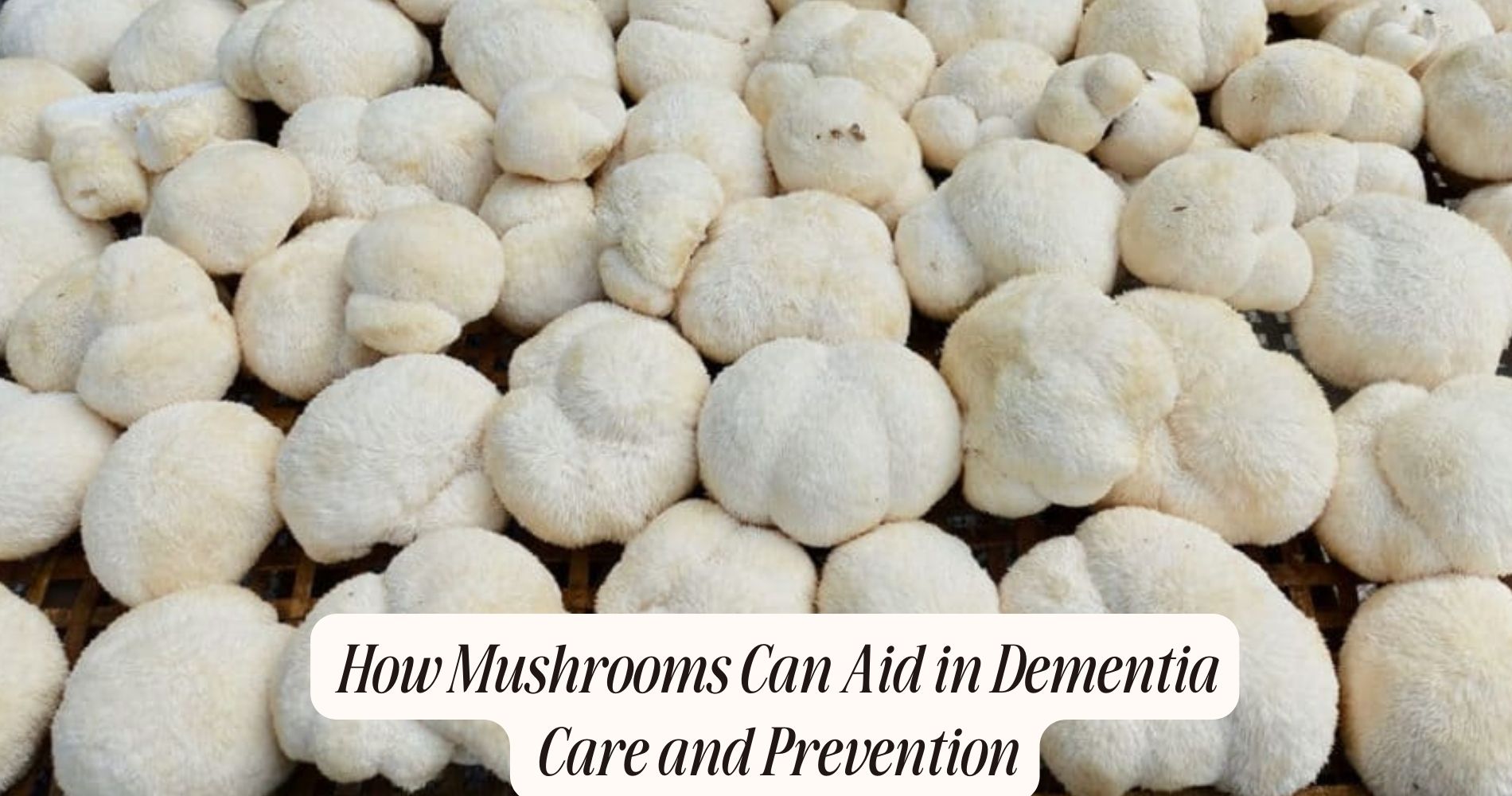
How Mushrooms Can Aid in Dementia Care and Prevention
Incorporating mushrooms for dementia care can be highly beneficial due to their neuroprotective and antioxidant properties. Varieties like Lion's Mane are rich in hericenones and erinacines, compounds that encourage the production of nerve growth factors and support neuronal health. These mushrooms are also loaded with antioxidants such as ergothioneine and glutathione, which help combat oxidative stress and potentially reduce cognitive decline.
Additionally, the presence of B vitamins and vitamin D in mushrooms supports neuroplasticity and neurotransmitter synthesis, both crucial for maintaining cognitive functions. Clinical trials have begun to document the positive impacts of mushrooms in dementia care, underscoring their significant role in promoting brain health. Adding mushrooms to a balanced diet can offer sustained neuroprotective advantages, as ongoing research continues to reveal more about their efficacy.
Understanding Dementia
Dementia, frequently characterized by a decline in cognitive function beyond what might be expected from normal aging, encompasses various symptoms including memory loss, impaired reasoning, and communication difficulties. As you navigate the complexities of dementia, you'll find that identifying dementia symptoms early is essential for effective management.
Common symptoms include disorientation, difficulty with familiar tasks, and changes in mood and personality. The diagnosis process for dementia is multifaceted, involving a thorough medical history review, physical examination, and cognitive testing. Physicians often use tools like the Mini-Mental State Examination (MMSE) or the Montreal Cognitive Assessment (MoCA) to evaluate cognitive function.
Neuroimaging techniques such as MRI or CT scans are also employed to identify any structural brain changes that might contribute to cognitive decline. Laboratory tests can rule out other conditions that mimic dementia symptoms, such as vitamin deficiencies or thyroid disorders.
Early and accurate diagnosis not only helps in planning appropriate care but also allows for the timely implementation of interventions that can slow the progression of dementia. By understanding the diagnostic process and recognizing symptoms, you can better advocate for effective treatment and support strategies.
Mushrooms' Nutritional Profile
You'll find that mushrooms boast a robust nutritional profile, particularly rich in antioxidants such as ergothioneine and glutathione. These compounds play a critical role in combating oxidative stress, a factor linked to neurodegenerative diseases like dementia.
Additionally, mushrooms are high in essential vitamins like B-complex vitamins and vitamin D, which support cognitive function and overall brain health.
Rich in Antioxidants
Mushrooms' rich antioxidant profile, including compounds like ergothioneine and glutathione, plays an important role in neutralizing free radicals and reducing oxidative stress, which are key factors in neurodegenerative diseases. As potent antioxidant sources, these compounds are essential dietary antioxidants that can greatly impact brain health.
Ergothioneine, a unique antioxidant found in mushrooms, has been shown to cross the blood-brain barrier, hence directly contributing to the brain's defense against oxidative damage. Clinical studies indicate that higher levels of ergothioneine correlate with lower incidences of cognitive decline.

You should also consider the role of glutathione, another powerful antioxidant present in mushrooms. Glutathione is crucial for maintaining cellular health by aiding in detoxification processes and enhancing the immune response.
The synergistic effect of ergothioneine and glutathione makes mushrooms an exceptional choice for mitigating oxidative stress, a common precursor to dementia and other neurodegenerative conditions.
Incorporating mushrooms into your diet can therefore provide a strong defense against oxidative stress through these dietary antioxidants. By regularly consuming mushrooms, you can tap into their rich antioxidant profile to potentially lower your risk of cognitive impairment and support overall brain health.
High Vitamin Content
Several essential vitamins, including B vitamins (such as riboflavin, niacin, and pantothenic acid) and vitamin D, are abundantly found in mushrooms, contributing to their extensive nutritional profile. These vitamins play a critical role in maintaining cognitive health, particularly in the context of dementia care and prevention. B vitamins, for instance, are involved in energy production and neurotransmitter synthesis, processes essential for peak brain function.
Vitamin D, synthesized in mushrooms exposed to sunlight, is indispensable for calcium homeostasis and bone health. More importantly, it influences neuroplasticity and reduces neuroinflammation, both of which are crucial in dementia prevention. The high vitamin content in mushrooms also ensures improved nutrient absorption, enhancing overall metabolic health.
Vitamin synergy is another important factor to take into account. For example, the presence of multiple B vitamins in mushrooms allows for better absorption and utilization of these nutrients in the body. This synergy enhances their collective efficacy in supporting neuronal health, thereby potentially mitigating cognitive decline.
Incorporating mushrooms into your diet can thus serve as a proactive measure in dementia care. Their high vitamin content provides a multi-faceted approach, addressing various biochemical pathways that contribute to cognitive health.
Key Compounds in Mushrooms
You'll find that mushrooms contain key compounds with significant neuroprotective properties, such as hericenones and erinacines. These compounds have shown promise in enhancing neuronal growth and reducing oxidative stress.
Additionally, the antioxidants in mushrooms, like ergothioneine and glutathione, offer potential benefits for mitigating neurodegenerative processes.
Neuroprotective Properties Explored
Intriguingly, recent studies have identified key compounds in mushrooms such as hericenones and erinacines that exhibit significant neuroprotective properties. These bioactive molecules are primarily found in Lion's Mane mushroom (Hericium erinaceus) and have been shown to stimulate the production of nerve growth factor (NGF), a protein essential for the maintenance and survival of neurons.
By including Lion's Mane in your dietary choices, you can potentially support brain health and mitigate the risk of neurodegenerative diseases such as dementia.

Evidence suggests that hericenones and erinacines exert their protective effects by promoting neurogenesis and enhancing synaptic plasticity. In clinical trials, participants consuming Lion's Mane extracts demonstrated improved cognitive function and reduced symptoms of mild cognitive impairment. This neuroprotective action is crucial, as it can help preserve cognitive function and slow the progression of dementia.
Moreover, these compounds have been shown to cross the blood-brain barrier, ensuring that their beneficial effects directly impact the central nervous system. By incorporating mushrooms rich in hericenones and erinacines into your diet, you're making a proactive choice to safeguard your brain health.
This evidence-based approach underscores the importance of dietary choices in long-term cognitive well-being.
Antioxidant Benefits Highlighted
Leveraging their high antioxidant content, mushrooms like Reishi and Chaga offer potential benefits for mitigating oxidative stress linked to dementia. These fungi are rich in bioactive compounds such as polysaccharides, triterpenoids, and phenolic compounds, which have been shown to neutralize free radicals. By reducing oxidative stress, these antioxidants can help protect neuronal cells from damage, thereby potentially slowing the progression of cognitive decline in dementia patients.
Research indicates that oxidative stress plays an essential role in the pathogenesis of neurodegenerative diseases, including Alzheimer's and Parkinson's. Free radicals, unstable molecules generated by metabolic processes and environmental factors, cause cellular damage when they accumulate unchecked. The antioxidants found in mushrooms can scavenge these free radicals, reducing their harmful effects.
Clinical studies have demonstrated that Reishi and Chaga extracts can enhance the body's antioxidant defense mechanisms. For example, Reishi has shown potential in increasing the activity of superoxide dismutase (SOD) and glutathione peroxidase (GPx), two critical antioxidant enzymes.
Similarly, Chaga's high levels of melanin and betulinic acid contribute to its potent antioxidant properties.

Cognitive Function Enhancement
Recent studies indicate that certain compounds in mushrooms may play a significant role in enhancing cognitive function in individuals with dementia. Specifically, ergothioneine and hericenones have garnered attention for their potential cognitive benefits.
Incorporating mushrooms into your daily diet can complement other lifestyle changes aimed at cognitive improvement, such as regular mental exercises and a balanced diet.
Ergothioneine acts as a potent antioxidant, reducing oxidative stress in the brain, which is an important contributor to cognitive decline. Additionally, hericenones, primarily found in Lion's Mane mushrooms, promote the synthesis of nerve growth factor (NGF), essential for neuronal health and cognitive function. These compounds can be effective adjuncts to other non-pharmacological interventions.
Clinical trials have demonstrated that participants consuming mushroom extracts showed improvements in memory recall and executive function tests. When combined with mental exercises like puzzles and memory games, the cognitive benefits are further amplified.
This holistic approach, integrating dietary changes with cognitive activities, can provide a more robust defense against dementia-related cognitive decline.
Neuroprotective Properties
Several studies have identified that mushrooms possess neuroprotective properties that can mitigate neuronal damage associated with dementia. By incorporating mushrooms into your diet, you're introducing bioactive compounds that support brain health.
For instance, certain mushrooms like Lion's Mane contain hericenones and erinacines, which have been shown to stimulate nerve growth factor (NGF) synthesis. NGF plays a pivotal role in the growth, maintenance, and survival of neurons, thereby potentially slowing cognitive decline.

Additionally, mushrooms are rich in antioxidants such as ergothioneine and glutathione, which combat oxidative stress—a significant contributor to neurodegenerative diseases. Oxidative stress leads to neuronal damage and inflammation, accelerating cognitive decline. By reducing this stress, mushrooms help maintain the integrity of neuronal cells and support overall brain health.
Moreover, mushrooms contain anti-inflammatory properties. Chronic inflammation is a known factor in the progression of dementia. By reducing inflammation, mushrooms can help protect neuronal pathways from damage and deterioration.
This multifaceted approach to neuroprotection makes mushrooms a valuable addition to your dietary regimen for dementia care and prevention.
Studies and Research Findings
Emerging research underscores the significant impact of mushrooms on cognitive health, with numerous clinical trials and observational studies highlighting their potential benefits in dementia care. One such study conducted in Singapore involved over 600 elderly participants and spanned six years. Researchers measured cognitive decline through standardized neuropsychological tests and found that those who consumed mushrooms regularly had a 50% reduced risk of developing mild cognitive impairment.
Clinical trials have also examined specific bioactive compounds found in mushrooms, such as ergothioneine and hericenones. Ergothioneine, an amino acid with potent antioxidant properties, has been linked to reduced oxidative stress and neuroinflammation, both of which are implicated in dementia pathogenesis. Hericenones, found in lion's mane mushrooms, have demonstrated the ability to stimulate nerve growth factor (NGF) synthesis, important for neuronal health.
Patient demographics play a pivotal role in these studies. Variability in age, gender, dietary habits, and genetic predispositions can influence outcomes. When interpreting results and tailoring recommendations for dementia care, it's crucial to take these factors into account.
Incorporating Mushrooms in Diet
Incorporating mushrooms into the diet for dementia care involves selecting species known for their bioactive compounds, such as lion's mane and shiitake, and ensuring consistent consumption to maximize neuroprotective benefits.
Lion's mane, for instance, contains hericenones and erinacines, which have been shown to stimulate nerve growth factor synthesis, potentially aiding in cognitive function.
Shiitake mushrooms are rich in polysaccharides and antioxidants, contributing to reduced oxidative stress and inflammation, which are key in neurodegenerative conditions.

To harness these benefits, you should integrate these mushrooms into your daily meals. Their culinary versatility allows them to be used in a variety of dishes, from soups and stews to salads and stir-fries, making consistent consumption easier to achieve.
Additionally, mushrooms can serve as a taste enhancement, adding a savory umami flavor that complements numerous recipes.
It's essential to source high-quality mushrooms, preferably organic, to avoid exposure to harmful pesticides. Fresh or dried options can be utilized, and supplements are available if dietary inclusion proves challenging.
Potential Risks and Considerations
While integrating mushrooms like lion's mane and shiitake into your diet offers numerous benefits, it's important to recognize potential risks and considerations associated with their consumption. One significant concern is the possibility of allergic reactions. Some individuals may experience hypersensitivity to fungal proteins, which can manifest as skin rashes, respiratory issues, or gastrointestinal disturbances. It's advisable to begin with small quantities to monitor any adverse reactions before incorporating these mushrooms more extensively into your diet.
Another critical consideration is the potential for medication interactions. Mushrooms like lion's mane contain bioactive compounds that can influence enzymatic pathways in the liver, potentially altering the metabolism of certain medications. For instance, lion's mane may inhibit cytochrome P450 enzymes, affecting drugs metabolized through this pathway. If you're taking medications, particularly those with a narrow therapeutic index, consult your healthcare provider to evaluate the potential for interactions.
Additionally, the quality and source of mushrooms are paramount. Contaminants such as heavy metals and pesticides can pose health risks, so opt for mushrooms from reputable suppliers who adhere to stringent safety standards.
Careful consideration and professional guidance can help you maximize the benefits of mushrooms while mitigating risks.
Try SUPER MUSHROOM GUMMIES for Enhanced Brain Health
To seamlessly incorporate the benefits of mushrooms into your daily routine, consider trying Well Gummies' SUPER MUSHROOM GUMMIES. These convenient and tasty gum chews pack the power of 10 different types of mushrooms, making it easier than ever to support your brain health and overall wellness. Each gummy is crafted to provide calmer energy, sharper focus, and robust immune support, all while tasting like fresh wild berries—your new favorite treat without the jitters or crash. Enhance your body's natural vitality and maintain a clear mind with these vegan, deliciously effective supplements.
Frequently Asked Questions
Can Mushrooms Be Used as a Supplement or Only as Whole Foods?
You can use mushrooms as both supplements and whole foods. Supplement forms often contain concentrated bioactive compounds, offering a standardized dose. Whole foods provide additional nutrients and fiber, supporting overall health with a broader nutritional profile.
How Do Cooking Methods Affect Mushrooms' Beneficial Properties?
You should consider the cooking temperature when preparing mushrooms, as high heat can reduce nutrient retention. Studies show that lower temperatures, such as steaming or microwaving, better maintain their beneficial compounds, enhancing their health benefits.
Are There Specific Mushroom Varieties That Are Best for Dementia Care?
Yes, you should consider Lion's Mane and Reishi mushrooms. Clinical studies show Lion's Mane enhances cognitive function, while Reishi offers neuroprotective effects. Incorporating these into your diet may provide significant benefits for dementia care and prevention.
What Are the Recommended Daily Amounts of Mushrooms for Cognitive Benefits?
For cognitive benefits, the recommended dosage of mushrooms varies. Clinical studies suggest consuming approximately 100-200 grams daily. Always consult your healthcare provider to customize the dosage to your specific health needs and guarantee maximum cognitive benefits.
Can Children and Pregnant Women Safely Consume Mushrooms for Cognitive Health?
Yes, children and pregnant women can safely consume mushrooms for cognitive health. Guarantee proper nutrient absorption and monitor developmental impacts. Consult a healthcare professional to confirm the appropriate types and quantities for individual needs.
Conclusion
Incorporating mushrooms into your diet could offer significant benefits for dementia care and prevention. Their rich nutritional profile, combined with key compounds like ergothioneine and hericenones, demonstrates potential for cognitive enhancement and neuroprotection.
Evidence-based studies support these findings, suggesting that regular consumption may help maintain brain health. However, it's important to take into account potential risks and consult healthcare providers to tailor dietary choices to individual needs and conditions.




